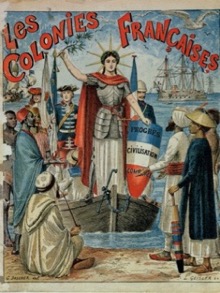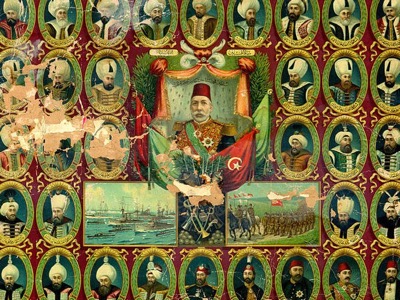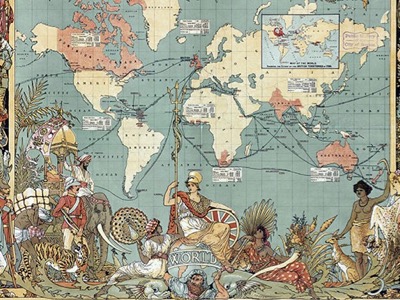Search
Recent comments
- ignoring....
44 min 29 sec ago - antisemitismus
3 hours 33 min ago - trust me.....
5 hours 3 min ago - WATCH again.....
5 hours 27 min ago - pedo-zionists....
5 hours 52 min ago - silently....
6 hours 23 min ago - khatyn....
16 hours 28 min ago - criminal....
19 hours 27 min ago - not even ten per cent there.....
19 hours 57 min ago - scams & rorts....
23 hours 48 min ago
Democracy Links
Member's Off-site Blogs
the "new" colonialists...
The French Empire
For a decade we have been revealing the incongruity of the French desire to re-establish its authority over its old colonies. This was the logic behind the nomination by President Nicolas Sarkozy of Bernard Kouchner as Minister for Foreign Affairs. Kouchner replaced the French Revolutionary idea of « The Declaration of the Rights of Man and of the Citizen » with the Anglo-Saxon notion of « Human Rights » [1]. Later, his friend President François Hollande declared, during a Press conference on the fringes of the UN General Assembly, that it was time to re-establish a mandate over Syria. The great grand-nephew of ambassador François George-Picot (of the Sykes-Picot agreement), ex-President Valéry Giscard d’Estaing, spoke of this even more clearly. This should help us better to understand the desire of President Emmanuel Macron to continue the war against Syria, without the United States.
There has always been a « colonial party » in France which crosses all political parties and acts as a lobby in the service of the wealthy class. Just as in every period when it becomes difficult for unscrupulous capitalists to crush the national work-force, the myth of colonial conquest resurfaces. If the « Yellow Vests » revolt, let us continue with the « exploitation of men by other men » on the backs of the Syrians.

- The French Empire « bestows » civilisation
Long ago, this form of domination hid, according to the words of Jules Ferry – under whose auspices François Hollande consecrated his son mandate [2] – behind the duty of « bestowing civilisation ». Today, it aims at protecting the people whose elected leaders are qualified as « dictators ».
France is not the only ancient colonial power to act in this way. Turkey quickly followed on.
The Ottoman Empire
Three months after the attempted assassination and aborted coup d’état of July 2016, President Recep Tayyip Erdoğan gave his inaugural speech from the university which bears his name (RTEÜ). He delivered a list of the ambitions of the Turkish Republic since its creation and those of his new régime [3]. Making an explicit reference to the « National Oath » (Misak-ı Millî) [4], which was adopted by the Ottoman Parliament on 12 February 1920, he justified his irredentism.
This Oath, which was the foundation of the passage of the Ottoman Empire to the Turkish Republic, lays claim to the territory in the North-East of Greece (Western Thrace and the Dodecanese) [5], all of Cyprus, the North of Syria (including Idlib, Aleppo and Al-Hasakah), and the North of Iraq (including Mosul).
Currently, the Empire in re-formation already occupies the North of Cyprus (the pseudo « Turkish Republic of Northern Cyprus »), the North-West of Syria, and a small part of Iraq. For all these areas, where the Turkish language and currency apply, prefects (« wali ») have been nominated, and their offices are situated in the White Palace of Ankara.

- The Ottoman Empire is founded on the ignorance of its subjects. It has closed schools in the Arab world.
The British Empire
As for the United Kingdom, it has been hesitating for two years about its future after the Brexit.
A little after the arrival of Donald Trump at the White House, Prime Minister Theresa May went to the United States. Speaking to the representatives of the Republican Party, she proposed re-establishing the Anglo-Saxon leadership of the rest of the world [6]. But President Trump has been elected to liquidate these imperial dreams, not to share them.
Disappointed, Theresa May then travelled to China in order to propose that President Xi Jinping share control of international exchanges. The City, she said, was ready to ensure the convertibility of Western currencies into Yuan [7]. But President Xi had not been elected to do business with an heiress of the power which had dismantled his country and imposed on the Chinese their opium war.
Theresa May tried a third version with the Commonwealth [8]. Some of the ex-colonies of the Crown, like India, are today enjoying powerful growth and could become precious commercial partners. Symbolically, the heir to the throne, Crown Prince Charles, was raised to the Presidency of this association. Mrs. May announced that we are on our way to a Global Britain.
In an interview with the Sunday Telegraph on 30 December 2018, the British Minister for Defence, Gavin Williamson, published his analysis of the situation. Since the fiasco of the Suez Canal in 1956, the United Kingdom has implemented a policy of decolonisation, and has withdrawn its troops from the rest of the world. Today, it conserves permanent military bases only in Gibraltar, Cyprus, Diego Garcia and the « Falklands », to give these islands their imperial title. For the last 63 years, London has been oriented towards the European Union, invented by Winston Churchill, but to which, initially, he never imagined that England would belong. The Brexit « tears this policy to shreds ». From now on, « the United Kingdom is back as a global power ».
London is planning to open two permanent military bases. The first will probably be in Asia (Singapore or Brunei), and the second in Latin America - most likely in Guyana, in order to participate in the new stage of the Rumsfeld-Cebrowski strategy of the destruction of those regions of the world which are not connected to globalisation. After the « African Great Lakes », the « Greater Middle East », it’s time for the « Caribbean Basin ». The war will probably start with an invasion of Venezuela by Colombia (pro-US), Brazil (pro-Israëli) and Guyana (pro-British).
Taking no notice of the smooth speechifying of the French, the English built an empire with the collaboration of multinational companies in the service of which it placed its army. They divided the world into two parts, which may be summed up as follows - the sovereign was the King of England (and therefore submitted to political tradition over here ) and the Emperor of India (in other words subjected to the private East India Company and unlimited autocrat over there).
Decolonisation was a corollary of the Cold War. It was forced on the States of Western Europe by the duopoly of the USA and the USSR. This held during the time of the unipolar world, but now meets no obstacles since the US withdrawal from the « Greater Middle East ».
It is difficult to anticipate what form this future colonisation will take. Long ago, it was made possible by the huge differences in the level of education. But today ?
Thierry MeyssanTranslation
Pete Kimberley
Read more:
https://www.voltairenet.org/article204731.html
- By Gus Leonisky at 16 Jan 2019 - 4:36am
- Gus Leonisky's blog
- Login or register to post comments

the US empire...
From Baghdad to Finland and All Across the World: What’s the US Up To?
OffGuardian is publishing here two articles on this subject from Helsinki Times, dated December 29, 2018 and January 1, 2019 respectively.GUARDED WAREHOUSES NEAR AIRPORT AND MYSTERIOUS CARGO FROM BAGHDAD
by Will Sillitoe
Why does the US Embassy in Helsinki need a big warehouse near Malmi Airport and what are the contents of thousands of kilograms of cargo sent to Helsinki from Baghdad?
A dilapidated warehouse in Malmi is being used by the US Embassy for unknown operations after a Wikileaks release revealed its location.
The anonymous looking building on Takoraudantie is notable only for the new 427 meter perimeter fence that according to the Wikileaks’ database was ordered by the US Embassy in April 2018.
Situated across the street from the main entrance of Malmi Airport, the warehouse with its 3 meter high security fence appears an unlikely location for official embassy business. Neighbouring companies include a car yard and a tyre warehouse.
Helsinki Times visited the perimeters this weekend. Security personnel, young Finns in uniforms with American flags on their arms, appeared nervous and suspicious when asked to comment on the warehouse and refused to even confirm the order of the new fence structure which now surrounds the compound. At one point a security guard appeared in a second floor window to carefully monitor this reporter’s movements along Takoraudantie.
Read more:
https://off-guardian.org/2019/01/15/from-baghdad-to-finland-and-all-acro...
Probably preparing for some mischief with Russia... What may come from "Baghdad" may not come from "Baghdad"... "Baghdad may be used as a fudge transport "stopover" for material coming from the USA which may be illegal to import from the USA into Finland. Imagine deplete uranium ammunitions, spying hardware, phosphorus bombs, chemical warfare and biological warfare equipment... etc...
the western illusions about the russian empire...
It is commonplace for Americans to portray Russia as a dangerous country with nearly unlimited territorial ambitions. But the facts simply do not support such an alarmist view. Instead, Russia’s behavior is more consistent with that of a beleaguered regional power trying to fend off hostile intrusions from an American-led NATO.
The self-serving myth of a malignantly aggressive Russia, however, continues to grow—with potentially dangerous consequences for European and global peace.
Assertions that Moscow’s behavior pose a serious, even an existential, threat to Europe and the entire democratic West surfaced even before Donald Trump became president. They flared up in 2008 when fighting erupted between Russia and neighboring Georgia—even though the latter country had initiated the aggression. Senator John McCain asserted that “it’s very clear that Russian ambitions are to restore the old Russian Empire.”
Such allegations became more pervasive when Moscow annexed Ukraine’s Crimea Peninsula in 2014 following the Western-assisted Maidan revolution that overthrew Ukraine’s elected, pro-Russian government. Ultra-hawkish writer and media talking head Ralph Peters asserted that Putin had a detailed plan for reclaiming the Russian empire. “Make no mistake,” Peters warned, “Putin truly believes he’s entitled to reclaim Ukraine and a great deal more. In his view, independent capitals from Warsaw (yes, Warsaw) to Bishkek [the Kyrgyz Republic’s capital] are integral and natural parts of the Russian imperium. He regards them as property stolen from its rightful owner: Moscow.” Hillary Clinton’s rhetoric was even more apocalyptic: Putin’s actions, she contended, were “what Germany did back in the ‘30s.”
Such hyperbole has continued and even increased over the past five years on both sides of the Atlantic. In a March 2017 interview, Dalia Grybauskaitė, president of Lithuania, stated bluntly: “Russia is a threat not only to Lithuania but to the whole region and to all of Europe.” Poland’s foreign minister, Witold Waszczykowski, was equally alarmist, insisting that Russia’s behavior posed an “existential threat” even greater than ISIS.
Russia’s conduct has been abrasive and aggressive at times, but there is no evidence that Moscow harbors expansionist ambitions remotely comparable to those of Nazi Germany and the Soviet Union. Indeed, the Kremlin’s actions suggest a much more limited, perhaps even defensive, agenda. As professors Andrei Shleifer and Daniel Treisman observed in Foreign Affairs, “To many in the West, Russia’s 2008 invasion of Georgia seemed to prove the Kremlin’s land hunger.” But such a conclusion reflects poor logic: “Kremlin leaders bent on expansion would surely have ordered troops all the way to Tbilisi to depose [Georgia President Mikheil] Saakashvili. At the least, Russian forces would have taken control of the oil and gas pipelines that cross Georgia. Instead, the Russians left those pipelines alone and quickly withdrew to the mountains.”
Shleifer and Treisman raise a very important point. If Putin is a rogue leader with massive expansionist objectives, why would he relinquish territory that Russian forces had occupied? Indeed, with very little additional effort, Russia could have captured Tbilisi and the rest of Georgia. Yet it did not attempt to do so. Hitler never willingly gave up any of his conquests, and until the collapse of the Eastern European satellite empire in 1989-1991, the USSR disgorged only one occupied area: the portion of Austria it controlled at the end of World War II. Even that modest retreat took place only after laborious negotiations for a treaty guaranteeing Austria’s strict neutrality. If Putin truly harbors malignantly expansionist ambitions comparable to those of Hitler and Stalin, declining to conquer and absorb all of Georgia when that achievement was easily within reach showed curious restraint. His decision merely to perpetuate and consolidate Moscow’s treatment of Georgia’s two secessionist regions, Abkhazia and South Ossetia, as Russian protectorates suggests much more limited ambitions.
Another aspect of Russia’s behavior is decidedly inconsistent with a rogue expansionist power: its military spending is modest and declining, not robust and surging. True, Putin has sought to rebuild and modernize Russia’s military, and he has achieved some success in doing so. Russia’s navy once again deploys modern vessels, and its air force is now flying modern, even cutting-edge aircraft. Putin’s regime has also focused on developing and deploying long-range, precision-guided weapons, and is pursuing military research and development efforts with respect to hypersonic aircraft and missiles.
Even those developments must be put into perspective, however. The restoration and modernization follows a decade of military decline and decay during the 1990s under Boris Yeltsin. Moscow’s military budget is still a very modest $66.3 billion. Not only does the gargantuan U.S. budget of $716 billion dwarf that amount, it is far less than China’s $174.5 billion and only slightly more than the budgets of countries such as France and India. Moreover, in contrast to the sizable annual increases in U.S. spending levels, Russia’s military spending is declining, not rising. The 2017 budget was $69.2 billion, some $2.9 billion greater than the current budget. That is an odd trend for a government that supposedly harbors vast offensive ambitions.
The only undiminished source of Russian clout is Moscow’s large nuclear arsenal. But as various scholars have shown, while nuclear weapons may be the ultimate deterrent, they are not very useful for power projection or war fighting, except in the highly improbable event that a country’s political leadership is eager to risk national and personal suicide. And there is no evidence whatsoever that Putin and his oligarch backers are suicidal. Quite the contrary, they seem wedded to accumulating ever greater wealth and perks.
Too many Americans act as though we are still confronting the Soviet Union at the height of its power and ambitions. It will be the ultimate tragic irony if, having avoided war with a messianic, totalitarian global adversary, we now stumble into war because of an out-of-date image of, and policy toward, a conventional, regional power. Yet unless U.S. leaders change both their mindsets and their policies toward Russia, that outcome is a real danger.
Ted Galen Carpenter, a senior fellow in security studies at the Cato Institute and a contributing editor at The American Conservative, is the author of 12 books and more than 750 articles on international affairs. His latest book is Gullible Superpower: U.S. Support for Bogus Foreign Democratic Movements (2019).
Read more:
https://www.theamericanconservative.com/articles/russia-sure-behaves-str...